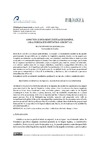Please use this identifier to cite or link to this item:
https://accedacris.ulpgc.es/jspui/handle/10553/70479
| Title: | Construcciones resultativas en español. Caracterización sintáctico-semántica | Authors: | Rodríguez Arrizabalaga, Beatriz | UNESCO Clasification: | 550510 Filología 570107 Lengua y literatura |
Keywords: | Construcción resultativa Predicación secundaria Atributo Cambio de estado Resultative construction, et al |
Issue Date: | 2016 | Journal: | Philologica canariensia | Abstract: | Debido a su escasa productividad en español, la construcción resultativa ha pasado prácticamente desapercibida en los estudios de lingüística española, donde o se ha negado por completo su existencia o se ha catalogado como una estructura resultativa falsa en tanto que solo semejante a su contrapartida inglesa en forma. Con objeto de demostrar, sin embargo, que se trata de un esquema oracional con autonomía propia en español, que, como tal, merece ser estudiado, este artículo analiza cinco de sus rasgos sintácticos, semánticos y pragmáticos distintivos, sin parangón en inglés: (i) el significado global de la construcción; (ii) las clases semánticas de verbos más recurrentes en la misma; (iii) la preferencia de su atributo tanto por la forma preposicional como por su anteposición a la base de la atribución; y, finalmente, (iv) su tendencia a presentar intensificación adverbial. Due to its low level of productivity in Spanish, the resultative construction has almost gone unnoticed in the Spanish linguistic studies, where either its existence has been completely denied or it has been considered a fake resultative pattern, being just similar to its English counterpart in form. In order to prove, however, that the resultative construction is a clausal structure with an autonomy of its own in Spanish and that it deserves being studied as such, this paper analyses five of its distinguishing syntactic, semantic and pragmatic traits, with no resemblance in English: (i) the global meaning of the construction; (ii) the semantic classes of verbs most recurrent in it; (iii) the preference that the resultative attribute shows both for the prepositional form and for its anteposition to its logical subject; and, finally, (iv) its tendency to be modified by adverbial intensifiers. |
URI: | https://accedacris.ulpgc.es/handle/10553/70479 | ISSN: | 2386-8635 | DOI: | 10.20420/PhilCan.2016.103 | Source: | Philologica canariensia [ISSN 2386-8635], n. 22, p. 55-87 |
| Appears in Collections: | Artículos |
WEB OF SCIENCETM
Citations
6
checked on Feb 8, 2026
Page view(s) 5
77
checked on Jan 11, 2026
Download(s)
84
checked on Jan 11, 2026
Google ScholarTM
Check
Altmetric
Share
Export metadata
Items in accedaCRIS are protected by copyright, with all rights reserved, unless otherwise indicated.
